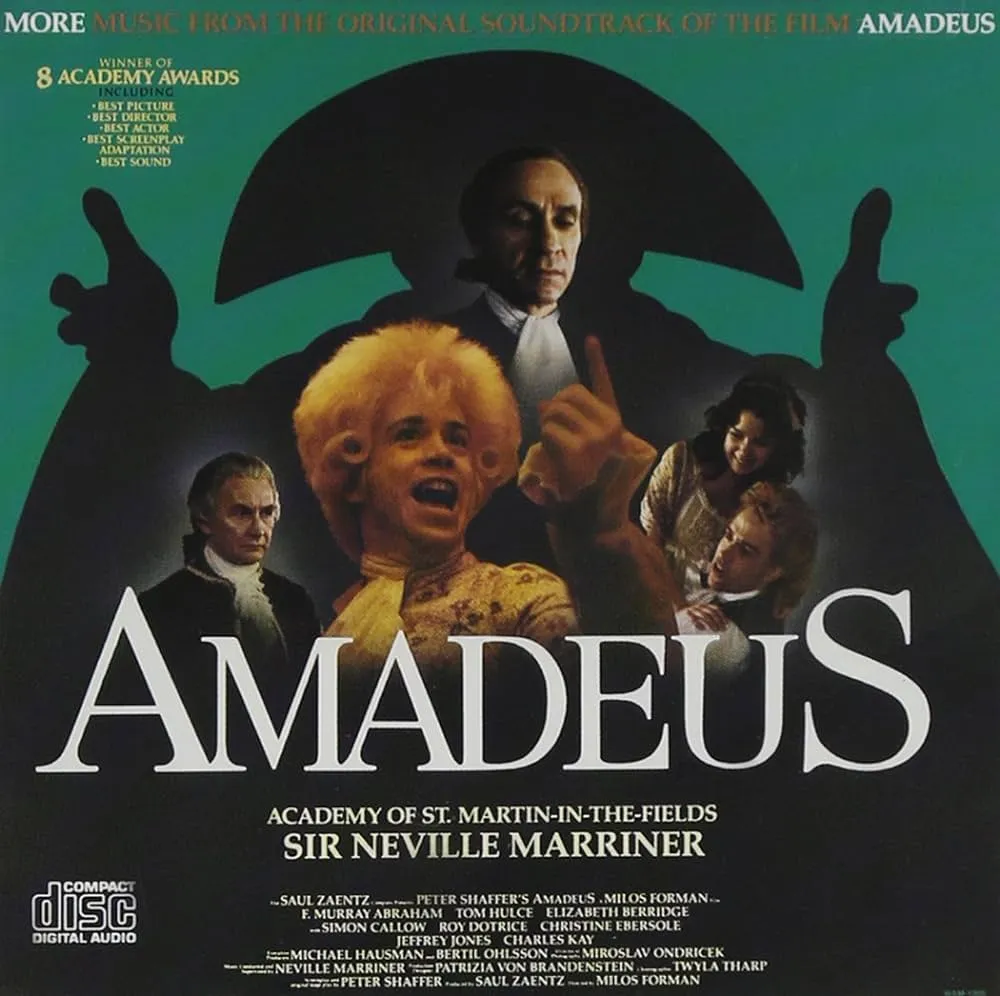
Amadeus is a 1984 American period biographical drama film directed by Miloš Forman and adapted by Peter Shaffer from his 1979 stage play of the same name.
The film is a fictionalized account of the relationship between Wolfgang Amadeus Mozart and his contemporary, Antonio Salieri. It is not intended to be a factually accurate biopic of Mozart, as it takes liberties with history.
The movie won eight Academy Awards, including Best Picture, and was well-received for its lavish production, inspired casting, and Mozart's rapturous music.
Plot
Amadeus is a 1984 film that tells the story of the life, success, and troubles of Wolfgang Amadeus Mozart, as narrated by Antonio Salieri, a contemporaneous composer who was deeply jealous of Mozart. The plot revolves around Salieri's complex scheme to gain ultimate victory over Mozart and God. He disguises himself and commissions Mozart to write a requiem mass, with the intention of murdering Mozart. The film is a fictionalized account and is not intended to be a factually accurate portrayal of Mozart's life.
Trailer
Cast
- F. Murray Abraham as Antonio Salieri
- Tom Hulce as Wolfgang Amadeus Mozart
- Elizabeth Berridge as Constanze Mozart
- Simon Callow as Emanuel Schikaneder
- Roy Dotrice as Leopold Mozart
- Christine Ebersole as Katherina Cavalieri
- Jeffrey Jones as Emperor Joseph II
- Charles Kay as Count Franz von Strack
- Ken Russell as Cardinal Colloredo
- Milan Kňažko as Baron Wolfgang von Kempelen
- Cynthia Nixon as Apollonia Wendt
- Patrick Frisch as Attendant
Petr Šec as Waiter
Director: Milos Forman
Writer: Peter Shaffer
Distributor: Orion Pictures, Warner Home Vídeo
Box Office Gross: $52,066,791
Genre: Biography, History, Drama
Release Date (Theaters): Nov 13, 1984
Release Date (Streaming): May 18, 2016
Themes & Reception
Amadeus explores themes such as confession, alienation, competition, devotion, identity, madness, and rebellion. The film received critical acclaim and won eight Academy Awards, including Best Picture. It was praised for its lavish production, inspired casting, and Mozart's rapturous music. However, some critics felt that the film's portrayal of Salieri as villainous was a shortcoming.
Challenges Faced During Production
The film faced challenges in maintaining the stature and power of the original stage play, with some feeling that the work's impact was diminished in its transition to the screen. Additionally, the naturalistic handling of the film was considered by some to be too subdued for a story that was conceived as highly stylized.
Settings, Visual Styles & Techniques
The film was lauded for its on-location filming in Prague, which provided an authentic 18th-century backdrop. The Tyl Theatre, where parts of "Don Giovanni" were staged, added to the film's historical appeal. However, some criticism was directed at the cinematography, which was described as overly brown and murky.
Trivia & Fun Fact
- The inspiration for the character of Salieri was a poem by Alexander Pushkin, written nearly 40 years after Mozart's death. In reality, Mozart and Salieri were not enemies, and Salieri did not kill Mozart as the legend suggests.
- The film's structure and content have been praised for their thematic and structural complexity, making Amadeus a dramatic masterpiece in its own right.